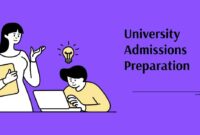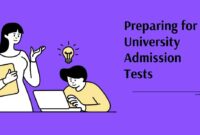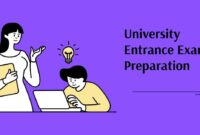Sarah stared at her practice test results, feeling overwhelmed. With just three months left before her university entrance exams, she realized that studying harder wasn’t the answer – she needed to study smarter. Like many students across Europe, Sarah discovered that university admission tests preparation precision was the key difference between acceptance and rejection letters.
You’re probably in a similar position right now. The competition for university spots has never been fiercer, and generic study approaches simply won’t cut it anymore. This article will show you exactly how to develop laser-focused preparation strategies that maximize your chances of success.
Understanding the Importance of Precision in Test Preparation
When it comes to university entrance exams, precision isn’t just helpful – it’s essential. College admission test preparation precision means targeting your study efforts exactly where they’ll have the most impact on your final scores.
Why Generic Study Plans Fall Short
Most students make the mistake of treating all subjects and topics equally. They spend hours reviewing material they already know well while neglecting areas where they’re genuinely weak. This scattered approach wastes precious time and energy that could be better invested in targeted improvement.
Your brain has limited capacity for absorbing new information. When you focus on university entrance exam accuracy in your preparation, you’re essentially optimizing your learning efficiency. Instead of spreading your efforts thin across everything, you concentrate on the specific areas that will boost your scores the most.
The Science Behind Focused Learning
Research shows that targeted study sessions produce better results than marathon cramming sessions. When you apply higher education exam targeted preparation principles, you’re working with your brain’s natural learning patterns rather than against them.
Your memory consolidates information more effectively when you focus intensely on specific topics for shorter periods. This is why precision-based study schedules often include 45-90 minute focused sessions followed by breaks, rather than endless hours of unfocused review.
Identifying Your Personal Weak Points
Before you can be precise, you need to know exactly what to target. Take diagnostic tests early in your preparation process to identify knowledge gaps. These aren’t just practice runs – they’re essential data collection tools for your academic entry test focused study plan.
Create a detailed breakdown of your performance by subject and topic. Look for patterns in your mistakes. Are you consistently struggling with certain types of math problems? Do you run out of time in specific sections? These insights will guide your precision-focused preparation strategy.
Building Your Precision-Based Study Strategy
Creating an effective study plan requires more than good intentions – it demands systematic analysis and strategic thinking. University selection exam precise strategies start with understanding both the exam format and your personal strengths and weaknesses.
Mapping the Exam Structure
Different European universities have varying admission requirements, but most standardized tests follow predictable patterns. Spend time understanding the exact format of your target exams, including question types, time limits, and scoring systems.
Break down each section of the exam and assign importance weights based on how much each contributes to your overall score. Some sections might be worth more points or be easier for you to improve quickly. This analysis forms the foundation of your college application exam exact methods.
Creating Your Personal Learning Profile
Not everyone learns the same way, and your preparation should reflect your individual learning style. Some students excel with visual aids like charts and diagrams, while others prefer auditory learning through recorded lectures or group discussions.
Identify which learning approaches work best for different types of content. You might discover that you memorize vocabulary more effectively through flashcards but understand complex concepts better through practical examples and real-world applications.
Setting Micro-Goals for Maximum Impact
Instead of vague goals like “improve math scores,” set specific, measurable targets. For example: “increase accuracy on quadratic equations from 60% to 80% within two weeks” or “reduce average time per reading comprehension question by 30 seconds.”
These micro-goals make your progress trackable and give you regular motivation boosts as you achieve them. They also help maintain the precision focus that separates successful test-takers from those who study hard but see minimal improvement.
Time Management and Scheduling Techniques
Effective time management isn’t about studying more hours – it’s about making every hour count. Admission test preparation accuracy depends heavily on how well you organize and allocate your study time.
The Power of Time-Blocking
Divide your available study time into specific blocks dedicated to different subjects or skills. This prevents the common problem of spending too much time on comfortable topics while avoiding challenging areas.
A typical precision-focused schedule might include 90 minutes for math problem-solving, followed by 60 minutes of vocabulary building, then 45 minutes of essay writing practice. Each block has a clear purpose and measurable outcome, ensuring that your campus entry exam targeted tactics remain focused and productive.
Implementing the Pomodoro Technique for Test Prep
The Pomodoro Technique adapts perfectly to exam preparation. Work in focused 25-minute intervals followed by 5-minute breaks, with longer breaks every four intervals. This approach maintains mental freshness while maximizing concentration.
During each Pomodoro session, focus on one specific skill or topic. You might spend one session on algebra problems, the next on reading comprehension passages, and another on essay outlining. This variety prevents mental fatigue while maintaining precision in your learning objectives.
Balancing Review and New Material
A common mistake is spending too much time reviewing familiar material because it feels comfortable and productive. However, academic testing precision planning requires a careful balance between reinforcing known concepts and learning new ones.
Follow the 70-30 rule: spend 70% of your time on areas where you need improvement and 30% on maintaining your existing strengths. This ensures steady progress without losing ground in areas where you’re already competent.
Subject-Specific Precision Strategies
Each subject area requires different approaches and techniques. What works for mathematics preparation won’t necessarily be effective for language arts or science sections.
Mathematics: Problem Pattern Recognition
Mathematics sections often recycle similar problem types with different numbers or contexts. Focus on recognizing these patterns rather than memorizing individual solutions. Practice identifying problem types within the first few seconds of reading them.
Create a personal database of problem types with your preferred solution approaches. When you encounter a challenging problem during practice, categorize it and note the specific techniques that led to the correct answer. This systematic approach improves both speed and accuracy on exam day.
Reading Comprehension: Strategic Skimming
Reading comprehension success depends more on strategic approaches than reading speed. Develop a systematic process for tackling passages: preview questions first, skim for main ideas, then read for specific details as needed.
Time yourself on different passage lengths and question types. Some students work best by reading the entire passage first, while others prefer reading questions first and then scanning for answers. Find your optimal approach through timed practice sessions, as detailed in comprehensive preparation strategies.
Writing Sections: Template Development
Strong writing scores come from clear structure and well-developed arguments, not just good grammar. Develop flexible templates for different essay types that you can adapt to various prompts.
Practice writing introductions and conclusions separately from full essays. These sections often determine first and last impressions on graders, so perfecting them can significantly impact your scores. Focus on crafting compelling thesis statements and memorable closing thoughts.
Practice Test Analysis and Improvement
Regular practice testing is essential, but many students don’t analyze their results effectively. University exam focused preparation requires systematic review of every practice attempt to identify improvement opportunities.
The Three-Pass Review System
After completing any practice test, review it three separate times with different focus areas. First, identify obvious mistakes and knowledge gaps. Second, analyze timing issues and strategic decisions. Third, look for patterns in your errors that might indicate deeper comprehension problems.
This multi-layered analysis reveals different types of improvement opportunities. Some errors stem from simple carelessness, others from knowledge gaps, and still others from poor time management or test-taking strategies.
Creating Error Pattern Logs
Keep detailed records of your mistakes, categorizing them by type, subject, and underlying cause. This data becomes invaluable for directing your future study efforts toward the areas with the highest potential for score improvement.
Your error log should include the specific question, your incorrect answer, the correct answer, and your analysis of why you made the mistake. Review these logs weekly to ensure you’re addressing recurring problems rather than just moving on to new material.
Simulating Test Conditions
Practice under realistic test conditions as much as possible. This includes proper timing, minimal distractions, and using only allowed materials. Many students perform well during casual practice but struggle under actual test pressure.
Gradually increase the realism of your practice sessions as your test date approaches. Start with untimed practice to build confidence, then add time pressure, and finally simulate the complete test experience including breaks and administrative procedures.
Mental Preparation and Test Day Strategies
Technical knowledge alone won’t guarantee success – you also need mental preparation and strategic test-day approaches. The most precisely prepared students often struggle if they haven’t developed psychological resilience and tactical awareness.
Building Confidence Through Systematic Progress
Confidence comes from documented improvement, not wishful thinking. Track your progress with specific metrics: accuracy percentages, completion times, and complexity levels of problems you can solve successfully.
Celebrate small victories along the way. When you master a previously challenging concept or improve your timing on a difficult section, acknowledge this progress. These psychological wins build the confidence you’ll need on test day, as outlined in proven success strategies.
Developing Test-Taking Tactics
Smart test-taking involves strategic decision-making under time pressure. Learn when to skip difficult questions, how to eliminate wrong answers efficiently, and which sections to tackle first based on your strengths.
Practice making quick decisions about question difficulty. Spend no more than 15-30 seconds deciding whether to attempt a question immediately or skip it for later review. This prevents getting stuck on single problems while easier questions remain unanswered.
Managing Test Anxiety
Even well-prepared students can be derailed by anxiety. Develop relaxation techniques that work for you, whether it’s deep breathing, progressive muscle relaxation, or positive visualization.
Create a pre-test routine that helps you feel calm and focused. This might include specific foods, physical exercises, or mental preparation rituals. Practice this routine during your preparation phase so it becomes automatic and comforting on test day.
Advanced Preparation Techniques
Once you’ve mastered the basics, advanced techniques can provide the competitive edge needed for highly selective programs. These approaches require more sophisticated thinking but can yield significant score improvements.
Cross-Subject Integration
Look for connections between different subject areas on your exams. Mathematical concepts often appear in science sections, while writing skills affect performance across multiple areas. Recognizing these connections helps you apply knowledge more broadly and efficiently.
Develop study sessions that intentionally combine multiple subjects. For example, practice scientific writing that requires both content knowledge and communication skills, or solve math problems presented in reading comprehension format.
Adaptive Learning Strategies
As your skills improve, your study approach should evolve accordingly. What worked during early preparation phases might become inefficient as you reach higher skill levels. Regularly reassess your methods and adjust them based on your current abilities and remaining weaknesses.
Advanced students often benefit from teaching concepts to others, creating their own practice problems, or tackling questions that go beyond typical test difficulty. These approaches deepen understanding and build confidence for handling unexpected challenges, similar to the advanced tactics used by top performers.
Technology and Resource Integration
Modern test preparation benefits enormously from smart technology use. However, not all digital resources are created equal, and precision requires selecting tools that genuinely enhance your learning rather than just providing entertainment.
Selecting High-Quality Digital Resources
Choose apps and online resources based on their alignment with your specific exam format and personal learning needs. Generic test prep apps might not address the particular requirements of European university admission tests.
Look for resources that provide detailed answer explanations, adaptive questioning that adjusts to your skill level, and comprehensive progress tracking. The best digital tools complement rather than replace traditional study methods.
Creating Digital Study Systems
Use technology to organize and enhance your precision-focused approach. Spreadsheets can track your progress across different topics, while apps can schedule study sessions and send reminders for review cycles.
Digital flashcards work well for memorization tasks, while online forums can provide access to other serious test-takers for discussion and motivation. However, maintain balance – excessive screen time can actually harm learning efficiency for some students.
Long-Term Success Planning
University admission test preparation is just one step in your educational journey. The precision skills you develop now will serve you well throughout your academic career and beyond.
Building Sustainable Study Habits
The focused learning techniques you develop for test preparation transfer directly to university coursework. Learning to identify key concepts, manage time effectively, and analyze your own performance creates a foundation for academic success that extends far beyond admission exams.
View your current preparation as an investment in long-term learning skills rather than just a hurdle to overcome. The discipline and analytical thinking you’re developing will benefit you throughout your university studies and professional career.
Preparing for Multiple Test Scenarios
Many students need to take several different admission tests or retake exams to improve their scores. Build flexibility into your preparation approach so you can adapt to different test formats or requirements without starting from scratch.
Keep detailed records of your preparation strategies and their effectiveness. This documentation becomes invaluable if you need to prepare for additional tests or help other students with their preparation journey, as detailed in comprehensive preparation steps.
Conclusion: Your Precision-Based Path Forward
University admission tests preparation precision isn’t about perfection – it’s about maximizing your efficiency and effectiveness within the time and resources available to you. By focusing your efforts strategically, analyzing your progress systematically, and adapting your approach based on evidence rather than hopes, you dramatically improve your chances of achieving your target scores.
Remember Sarah from our opening story? Three months of precision-focused preparation resulted in scores that exceeded her initial goals and earned her admission to her first-choice university. The difference wasn’t working harder – it was working smarter with clear objectives and systematic approaches.
Your success depends not on innate ability or luck, but on the quality and precision of your preparation strategy. Start implementing these techniques today, and you’ll be amazed at how much more effectively you can prepare for the academic challenges ahead. The investment you make in developing these precision-based study skills will pay dividends not just on your admission tests, but throughout your entire educational and professional journey.
The path to university admission success is challenging but entirely achievable when approached with the right combination of strategic thinking, systematic preparation, and persistent effort. Your future academic success starts with the precision-focused choices you make today.



